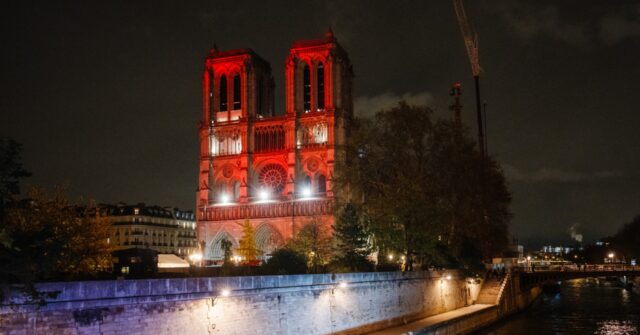On November 20, an international initiative marked Red Wednesday, a day dedicated to raising awareness of the persecution faced by Christians worldwide. Hundreds of notable buildings, including iconic churches and significant landmarks like the Westminster Parliament and the Hungarian Presidential Palace, were illuminated in red, symbolizing the blood shed by martyrs. Launched by the Catholic charity Aid to the Church in Need (ACN) in 2016, this effort aims to highlight ongoing anti-Christian persecution and advocate for religious freedom as a fundamental human right. The color red, traditionally associated with martyrdom, serves as a poignant reminder of the sacrifices made by countless believers. This year’s Red Week activities spanned over 20 countries, featuring around 300 events in places such as the UK, US, Canada, and various Latin American nations.
The current campaign has particularly spotlighted the plight of Christian children and young people who have been uprooted due to persecution and violent conflicts in various regions, especially Africa and the Middle East. A recent biennial ACN report, titled “Persecuted and Forgotten?”, reveals a troubling escalation in Christian persecution from 2022 to 2024. Of particular note is the shift of militant Islamist violence from the traditional hotbeds of the Middle East to sub-Saharan Africa. Countries such as Burkina Faso, Nigeria, and Mozambique have emerged as new epicenters of violence targeting Christians, with over two million people displaced in Burkina Faso alone due to prolonged Islamist insurgency.
In Nigeria, the situation remains dire, with a staggering ranking on the Global Terrorism Index and over 5,000 Christians reported killed for their faith within the last year alone. The persistent violence is primarily attributed to attacks by militant Fulani insurgents, who frequently target Christian communities. Tragically, these attacks have become all the more vicious, often aligning with Christian holidays—such as the brutal assault on Christmas Eve 2023, which resulted in significant loss of life. Coupled with the ominous reports of atrocities committed during Easter celebrations, the Nigerian government’s inaction regarding these violent episodes has raised serious concerns about the safety of Christians within the nation.
The plight of Christians extends beyond Africa, with Eritrea witnessing the imprisonment of approximately 400 Christians for their faith, often held without trial. This unjust detention reflects a growing trend where authoritarian regimes, particularly in countries like Eritrea, China, India, and Iran, increasingly target Christians as perceived threats to state security or social order. In India, specific reports highlight at least 720 instances of persecution against Christians in 2023, which marks a substantial increase from the previous year’s statistics. The increase in hostility toward Christians poses significant implications for religious minorities in authoritarian regimes as well as for community cohesion.
Compounding the challenges faced by Christians, the ACN report identifies a dangerous trend in which both state and non-state actors have increasingly manipulated legislation to justify the oppression of Christians and other marginalized religious groups. This environment of legalized discrimination has opened the floodgates for various forms of harassment and violence, particularly against vulnerable populations, such as Christian children and young girls. These youths have been subjected to abductions, sexual violence, forced marriages, and forced conversions, vulnerabilities that underscore the dire plight of communities living in fear due to sectarian violence.
For the first time in its 18-year history, Nicaragua has been included in the ACN report due to noteworthy human rights violations against Christians in the context of Daniel Ortega’s authoritarian regime. Measures such as the mass detention and expulsion of clergy illustrate how oppressive governance can directly target faith-based communities. The account of persecution detailed by the report underlines a pressing need for vigilance and advocacy in support of religious minorities facing existential threats. The narrative framed around Red Wednesday thus serves as a critical reminder of the ongoing struggles faced by Christians around the globe, underscoring the importance of collective awareness and action in addressing these profound injustices.

